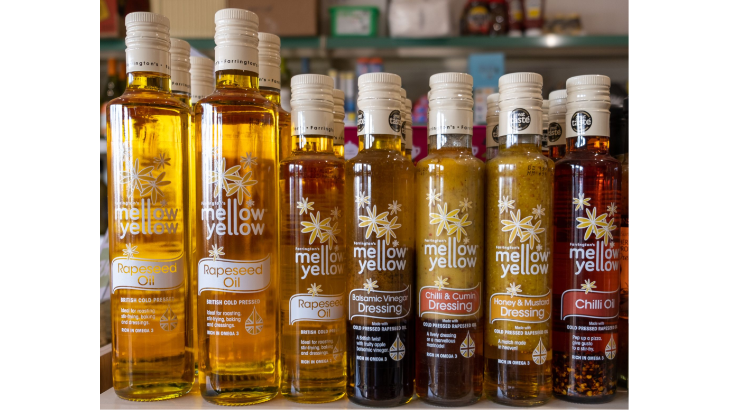Mellow Yellow

Rupert Knowles – CA-WN Farming Correspondent
Some of you may be old enough like me to remember dancing to Donovan’s 1966 hippy hit song by this name. But today, it is Farrington’s oils that invoke the magic of flower power. Farrington’s cold-pressed rapeseed oil is produced at Bottom Farm, Hargrave in North Northamptonshire and before Christmas I went to meet Duncan Farrington.
In 2005 after much research, Duncan with his mother’s help launched Mellow Yellow rapeseed oil. Today it is sold nationally and abroad. Duncan’s wife, Eli, is constantly developing and testing new products in the farm kitchen. On the Farrington Farm of 290 hectares, oilseed rape forms part of the rotation with cereals and beans. They are termed ‘combinable crops’ meaning they are harvested by standard combine harvesters. In addition, many local farmers are contracted to grow for Farrington's and all the farms are certified under the LEAF marque which demands high environmental standards stricter than Red Tractor.
Rapeseed used to be considered toxic to humans because of the high erucic acid content, but with modern varieties originally from Canada, the acid content is limited to 2%. For market acceptability, the oil is known as Canola in the Americas.
‘Cold pressing’ is a process with the seed being fed slowly through a screw and filtered out into large stainless steel tanks for storage. When I visited, the press had stopped for routine maintenance, but the press can run continuously for a long time. Other types of oil extraction involve heat and chemical solvents: their yield is higher but the oil inferior. Those oils are commonly used in biodiesel. With a high residual oil content the spent cake from cold pressing is a valuable addition to animal feeds.
You may have noticed the reduction in golden fields in recent years. Rape plants are attacked by the cabbage stem flea beetle which lays its eggs in the young plants in late summer. The larvae bore into the stem and damage the growing plant. Neonicotinoid systemic insecticides were developed in the 1980s and were used in seed coatings thus eliminating the need for spraying. It was a long time before it was realised that tiny quantities of this systemic chemical were finding their way into the nectar and pollen of rape plants and were responsible for a decline in bee populations (honey bees, bumble bees and others). The chemical affects the navigation of bees and they cannot find their way home. Neonics are now banned in the EU and UK, and many farmers gave up growing rape in desperation.
However, much research has led to cultivation methods that reduce the damage by the beetle and rape is making a come-back. It is a very useful break-crop in the
cereal rotation.
You can read about the Farrington business’ environmental credentials and more on the website: https://www.farrington-oils.co.uk/.
Most CA-WN members are keen to source their food locally. We are not in an area known for fruit and vegetables, but in the spring our fields glow yellow when the rape is in flower. Mellow Yellow is produced from local rapeseed and processed locally and naturally. As well as their own, all the farms supplying Farrington's are LEAF certified. Oil is not available from the farm but is stocked in a wide range of local shops and supermarkets such as Waitrose. Pitted against imported Olive, Sunflower, Soy, Peanut or Palm, Mellow Yellow is the natural oil to choose.

